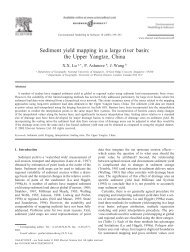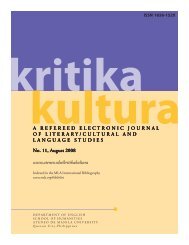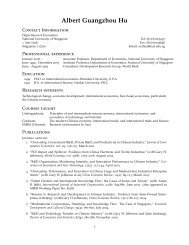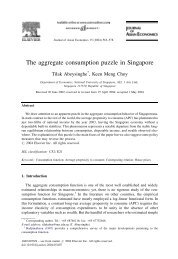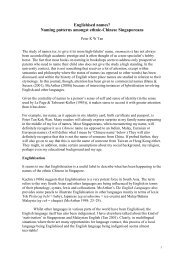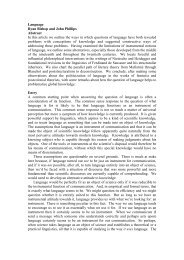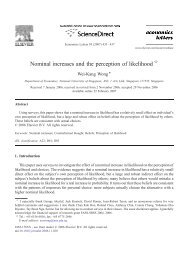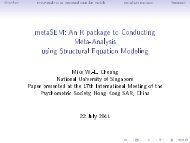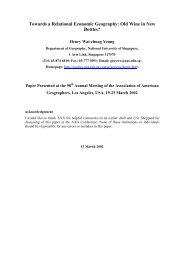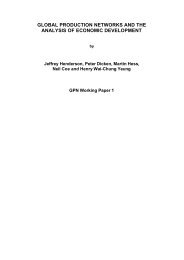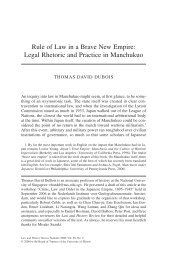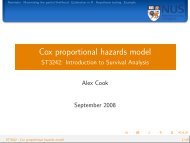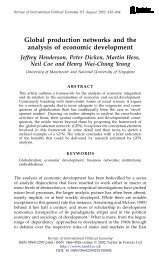Researching Hybridity in Social and Economic ... - NUS Home
Researching Hybridity in Social and Economic ... - NUS Home
Researching Hybridity in Social and Economic ... - NUS Home
You also want an ePaper? Increase the reach of your titles
YUMPU automatically turns print PDFs into web optimized ePapers that Google loves.
quantitative modelers did <strong>in</strong> the 1960s or those practitioners of the seem<strong>in</strong>gly endless case<br />
studies that come to dom<strong>in</strong>ate economic geography today. If economic geographers can be<br />
pluralistic <strong>and</strong> adventurous <strong>in</strong> their flirtations with social theories, why not spare a little time<br />
<strong>and</strong> effort to strengthen the discipl<strong>in</strong>e’s methodological foundations? All too often, <strong>in</strong> my<br />
view, our “philosophical horse” does not come with a “methodological cart”. Are we leav<strong>in</strong>g<br />
too much of our methodology <strong>and</strong> practice to other social scientists like sociologists? While<br />
research methods <strong>and</strong> practices are highly guarded territory <strong>in</strong> Sociology with its specialized<br />
journals (Sociological Methods <strong>and</strong> Research, Sociological Methodology, <strong>and</strong> Quality <strong>and</strong><br />
Quantity), methodological rigour is much less an issue <strong>in</strong> human geography, let alone<br />
economic geography. With some occasional exceptions of special issues on research<br />
methodology <strong>in</strong> geography journals, most of our journal pages are filled with substantive<br />
research publications that tend to gloss over serious methodological issues.<br />
This methodological experimentation <strong>in</strong> our research requires, however, a significant<br />
m<strong>in</strong>dset change that can be rather dem<strong>and</strong><strong>in</strong>g. First, it necessitates our role as active<br />
academicians. It is time for us to <strong>in</strong>teract with our research “subjects” not as impersonal<br />
encounters between the researcher <strong>and</strong> the researched. We need to underst<strong>and</strong> that the<br />
research act is as much about learn<strong>in</strong>g from our “subjects” as about them ga<strong>in</strong><strong>in</strong>g <strong>in</strong>sights <strong>in</strong>to<br />
our geographical imag<strong>in</strong>ations. By way of an example, I very much enjoy the few m<strong>in</strong>utes of<br />
“lectur<strong>in</strong>g” CEOs about what (economic) geography is whenever they ask why am I com<strong>in</strong>g<br />
from the Department of Geography. A mundane research <strong>in</strong>terview might just turn out to be a<br />
highly productive two-way learn<strong>in</strong>g process. Second, we have to be aware of the <strong>in</strong>herent<br />
fallibility of our knowledge, just like anybody else. Contrary to conventional wisdoms, we do<br />
not have privileged access to the world around us. <strong>Social</strong> actors have as important <strong>and</strong><br />
subjective knowledge about the fasc<strong>in</strong>at<strong>in</strong>g work<strong>in</strong>gs of the economic-geographical worlds as<br />
we do. So where does that leave us <strong>in</strong> this knowledge production system? I th<strong>in</strong>k we do have<br />
26



